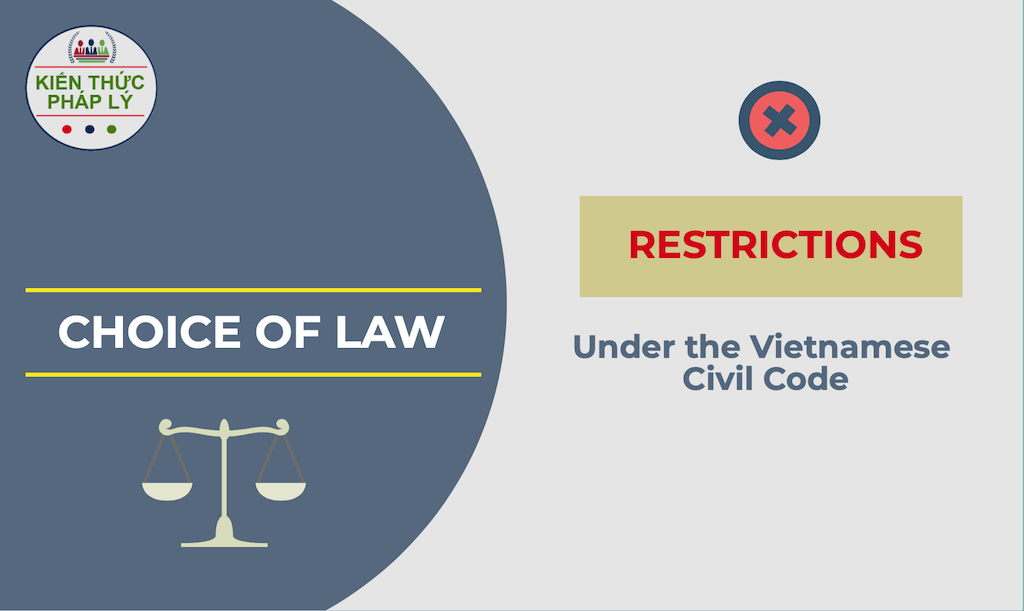The choice of law rendered to the parties in a contract involving foreign-elements has been explicitly acknowledged by the 2015 Civil Code of Vietnam. It is worth noting that the right to choose a governing law provided by the 2015 Civil Code is not unlimited but followed by a number of restrictions.
See the Vietnamese version of this article HERE.
1. General restrictions on the application of foreign law
The acknowledgment of the choice of foreign law is conditional upon the satisfaction of the below requirements set out by Article 670 of the 2015 Civil Code:
(1) The consequences of the application of the foreign law must not be contradictory to fundamental principles of the law of Vietnam
In which, the phrase “must not be contradictory to the fundamental principles of the law of Vietnam” or also known as “violation of public order” has been commonly employed by a variety of legislations in Vietnam in relation to the application of foreign laws, the recognition or enforcement of foreign arbitral awards or foreign court decisions.
(2) The contents of applicable foreign law must be clearly determined
To note that this requirement did not appear in the 2005 Civil Code but was added in the 2015 Civil Code. Pursuant to the 2015 Civil Procedure Code, the burden of proof on the contents of the foreign law lies upon the litigants[1]. If neither the litigants nor the competent Court upon requesting support from the Ministry of Justice, the Ministry of Foreign Affairs, etc. is able to identify the contents of foreign law, the laws of Vietnam shall apply[2]. Put differently, the choice of law under such a circumstance shall be deemed unenforceable.
See more: “Recognition and enforcement of foreign arbitral awards in Vietnam: Brief case study and Commentary“.
2. The subject matter of the contract is immovable property
Article 683.4 of the 2015 Civil Code reads:
“Where the subject matter of a contract is immovable property, the law applicable to transfer of ownership rights and other rights with respect to property being immovable property, [applicable to] lease of immovable property or use of immovable property in order to guarantee the performance of obligations shall be the law of the country in which the immovable property is located [lex situs].”
With respect to the above provisions, the following matters should be taken into account:
First of all, it is unarguable that Vietnamese law employs lex situs to determine the governing law of the contract of which subject matter is immovable property. However, the extent to which lex situs applies has been changed from “partially” under the 2005 Civil Code to “entirely” under the 2015 Civil Code. To clarify, lex situs in 2005 Civil Code is purported to direct governing law of the contract of which subject matter is the immovable property located in Vietnam to the Vietnamese laws while it is silent on the cases whereby the immovable property is not located in Vietnam[3]. The 2015 Civil Code has fixed this legal loophole by employing lex situs in its entire meaning. Put differently, regardless of whether the immovable property is in Vietnam or not, the governing law can always be identified. For instance, if the parties in Vietnam carry out a sale and purchase transaction of a property in the US, the laws of the US shall govern the above transaction as per the 2015 Civil Law (if this transaction occurs during the term of the 2005 Civil Law, it is difficult to determine the governing law).
Second, it is clear that not all contracts related to immovable property are governed by lex situs similar to the 2005 Civil Code. Instead, lex situs provided by the 2015 Civil Code is only applicable for (1) transfer contract of ownership rights and other rights with respect to property being immovable property; (2) lease contract of immovable property; and (3) contract for using the immovable property to guarantee the performance of obligations. This provision has been praised by many commentators as the choice of law for contracts involving immovable property is not completely abandoned[4]. For instance, with regards to the brokerage agreement for the property in the US, the restriction on the choice of law prescribed by Article 683.4 of the 2015 Civil Code shall not be applicable and therefore, the parties may freely choose the Vietnamese law or any other law system to govern its contract.
3. Labor Contract and Consumption Contract
Article 683.5 of the 2015 Civil Code reads:
“Where the law chosen by the parties to a labor contract or a consumption contract adversely affects minimum benefits of the employee or consumer as provided under the law of Vietnam, the law of Vietnam shall apply.”
As opposed to Article 683.4 of the 2015 Civil Code specified above, the 2015 Civil Code still allows the parties to choose the governing law for labor contract and consumption contracts. However, as the nature of a one-sided contract[5], the 2015 Civil Code protects the unfavorable side in such contracts (employee in labor contract and consumer in consumption contract) by guaranteeing their minimum benefits afforded by the Vietnamese laws. Put it simply, if their minimum benefits under the laws of Vietnam are adversely affected as the result of applying the foreign law, such choice of law shall be deemed invalid. Otherwise, if the foreign law offers the employee or consumer the benefits equal to or above the minimum benefits offered by the Vietnamese law, the choice of law shall be upheld.
[1] Article 481.1, the 2015 Civil Procedure Code.
[2] Article 481.4, the 2015 Civil Procedure Code.
[3] Article 769.2, the 2005 Civil Code.
[4] Thi Hong Trinh Nguyen, “Party autonomy in Vietnam – the new choice of law rules for international contracts in the civil code 2015” (2018) 14 Journal of Private International Law 343, 352
[5] Dr. Ngo Quoc Chien and Dr. Nguyen Minh Hang, “Governing law for contracts involving foreign elements pursuant to the 2015 Civil Code and recommendations for the Vietnamese enterprise”.
- CHUẨN MỰC “CẨN TRỌNG” TRONG QUẢN TRỊ DOANH NGHIỆP: NHẬN DIỆN, ĐÁNH GIÁ VÀ GIẢI PHÁP THỰC TIỄN - Tháng 8 16, 2025
- TUÂN THỦ PHÁP LUẬT LAO ĐỘNG CHO DOANH NGHIỆP – CÁC LOẠI BÁO CÁO ĐỊNH KỲ (PHẦN 1) - Tháng 4 9, 2025
- LỰA CHỌN CƠ QUAN GIẢI QUYẾT TRANH CHẤP TRONG GIAO DỊCH MUA BÁN CÔNG TY CÓ LIÊN QUAN ĐẾN BẤT ĐỘNG SẢN - Tháng 1 12, 2025








One Comment